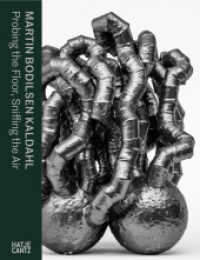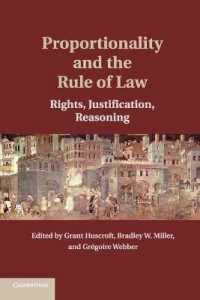- ホーム
- > 洋書
- > 英文書
- > Psychology
Full Description
The contributors to this handbook conduct a rigorous, innovative and distinctive analysis of the relationship between philosophy and psychoanalysis. Emphasising that any psychoanalytic subject or school necessarily involves philosophical reflection, the book examines the ways in which psychoanalysis and philosophy inform and intersect with each other - sometimes in mutual support, and sometimes in intense conflict. The book includes contributions from leading researchers across the world, both established and emerging, and traces the current state of the art in psychoanalysis and philosophy by exploring key issues, themes, topics and debates across the field.
Contents
Part One: Philosophical systems and psychoanalysis. Kant and psychoanalysis. Hegel and psychoanalysis. Nietzsche and psychoanalysis. Wittgenstein and psychoanalysis. Heidegger and psychoanalysis. Derrida and psychoanalysis.
Part Two: Psychoanalytic schools and their philosophical perspectives. Psychoanalytic schools. Freud and philosophy. The philosophy of classical psychoanalysis. The philosophy of Melanie Klein. The philosophy of Wilfred Bion. The philosophy of ego psychology. The philosophy of Donald Winnicott. The philosophy of self-psychology. The philosophy of intersubjective/interpersonal/relational. The philosophy of Lacan. The philosophy of Jung.
Part Three: Philosophical debates. How did the meaning of truth change throughout psychoanalytic history? What does it mean to know that something is true? What are the truths that psychoanalysis relates to and that relate to psychoanalysis? How did postmodern relativism and its intellectual pluralism influence psychoanalytic theory, technique and discourse? What is the current scientific status of psychoanalysis? How do philosophy and psychoanalysis inform each other regarding theories of mind, common sense psychology, meaning, consciousness, subjectivity, irrationality, intentionality, will, dreams and emotions? Is speech primarily a medium of psychoanalysis or a mechanism that participates in therapeutic action? What is the relation between trauma and language? Can poetry reveal the action of the verbal therapeutic process? What is the role of metaphoric thought in psychoanalytic discourse? How psychoanalytic theory influences moral philosophy through concepts such as moral authenticity, emotions and agency. The maintenance of boundaries in psychoanalytic encounter. Studying professional ethics in a psychoanalytic institute. The commitment to observing and processing countertransference as a major ethical obligation in psychoanalytic practice. Ethical obligations of psychoanalytic institutes to candidates and students. The "ethical turn" and phenomenological intersubjectivity. Witnessing as a distinct function of the therapist and as a curative element in psychoanalytic treatment.
Part Four: Applied subjects. Colonialism. Postcolonialism. The Primitive in Freud's Anthropological Texts. Racism. Franz Fanon. Anti-Semitism.








